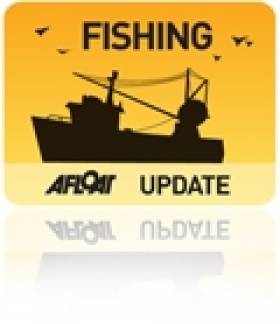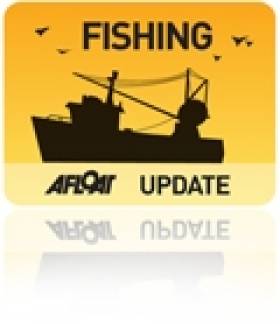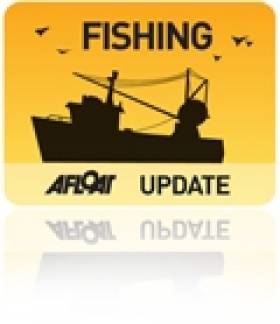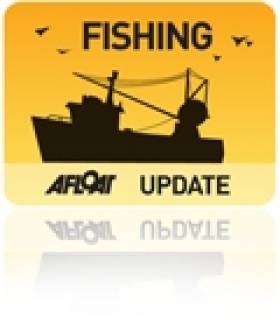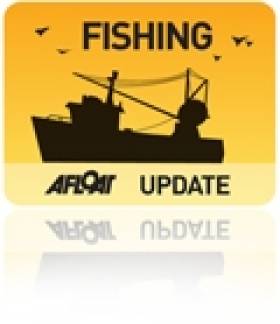Displaying items by tag: fish farming
Fish Farm Delays Not 'Inexplicable' Say Environmental Campaigners
#FISHING - Environmental campaigners have lambasted the IFA's claims of an "inexplicable delay" in the State's processing of licence applications for fish farms.
In a letter to The Irish Times yesterday, Tony Lowes of Friends of the Irish Environment says that the delay – to allow for proper environmental studies to be conducted – "has been explained again and again" by Minister for the Marine Simon Coveney.
He was responding to a letter last Friday by Richie Flynn of IFA Aquaculture, who highlighted the "suffering" of coastal communities as a result of processes that "hamper development and delay investment in the hundreds of companies involved in farming salmon, oysters, mussels, trout and other species".
Lowes writes in counter that salmon farming "is a highly polluting industry", and that discharge of nitrogen and phosphorous from aquaculture facilities "can fuel toxic algae blooms, which have cost the shellfish industry dear".
He claims that the proposed salmon farm in Bantry Bay in West Cork would have a nitrogen and phosphorous discharge "equivalent to the sewage of a town 10 times the size of Bantry".
Lowes also alleges that the deep-sea "super salmon" farm in Galway Bay - the licence application for which is undergoing statutory consultation till 2 October - would produce the equivalent effluent of a city more than double the size of Galway.
In addition, he makes reference to the threat to native salmon in Irish rivers through sea lice infestations.
"The EU habitats directive requires baseline studies and environmental impact statements," writes Lowes. "Licensees can be granted only if the project will not have adverse impacts on protected species and habitats."
Statutory Consultation Underway for Galway Bay Salmon Farm Licence
#FISHING - Bord Iascaigh Mhara (BIM) has begun the process of statutory consultation as the next step in its licence application for the controversial proposed deep-sea fish farm in Galway Bay.
As previously reported on Afloat.ie at the end of June, Ireland's fisheries board had announced a "significant delay" of four to six weeks before publishing the licence application.
But in a recent statement, BIM announced that it received permission some weeks ago from the Department of Agriculture, Food and the marine to begin the statutory consultation process, in which it is sharing the licence application and Environmental Impact Statement "with a list of State bodies for their appraisal and feedback".
The statutory consultation will continue till Tuesday 2 October 2012, and BIM promises that all feedback will be made available to the public via the BIM website "to further assist them in their assessment of the Environmental Impact Statement when it goes to full public consultation".
The 15,000-tonne organic salmon farm would be located off Inis Oírr in the Aran Islands on a 500-hectare site, and would be one of the largest of its kind in Europe, projected to be worth €103 million annually for the economy.
BIM intends to franchise the licence, should it be approved, to a third party "who agrees to a legally binding contract to farm the Atlantic salmon to the highest organic and environmental standards". Approval of the project could also see the creation of as many as 500 jobs, some 20% more than previously estimated.
The news comes after the ministerial apprival of salmon farm licence assignments from five separate operators in nearby Connemara, designed to "consolidate and revitalise" aquaculture in the region.
But the Aran Islands scheme has faced opposition from local anglers who fear that the fish farm could have a detrimental effect on wild salmon numbers.
Explaining BIM's plans for the consultation process, the statement added: "Previously, both statutory and public consultation would have been carried out in parallel. However, Ireland has recently (June 2012) ratified the Aarhus Convention. The convention lays down rules to promote citizens involvement and to improve public consultation in the making of decisions with potential environmental impact by the state.
"Given the recent ratification of the Convention and for a number of other legal and technical reasons, the Minister for Agriculture, Food and the Marine, Simon Coveney TD, has signed a new Statutory Instrument (SI No 301 of 2012), bringing into law new periods of public consultation for fish farm licence applications. In this instance the Department of Agriculture, Food and the Marine have instructed BIM to carry out statutory consultation in full before proceeding with public consultation.
"BIM believes that this approach will help to further inform the public during their period of consultation."
#FISHING - Bord Iascaigh Mhára (BIM) has moved to allay fears that the proposed new fish farm in the Aran Islands would have a detrimental effect on wild salmon numbers, according to the Galway Independent.
BIM was reacting to concerns raised at a meeting of the Federation of Irish Salmon and Sea Trout Anglers (FISTA) held last Sunday, ahead of which the federation's secretary Noel Carr described the fish farm plans as its 'Alamo'.
As previously reported on Afloat.ie, BIM launched the consultation process last December for its proposed deep-sea salmon farm in Galway Bay on a 500-hectare site north of Inis Óirr.
Approval of the project, which would be one of the largest of its kind in Europe, could see the creation of 350 direct and 150 indirect jobs.
Among his group's concerns, Noel Carr told the Galway Independent that salmon farms such as that proposed for Galway bay were finding wild fish out in the North Atlantic and “hoovering it up to make fish meal”.
But Donal Maguire, aquaculture development manager for BIM, said that argument was "not true", adding that "the world catch for fishmeal has been sustainable for about the last 35 years".
The Galway Independent has more on the story HERE.
#FISHING - The Irish Farmers' Association (IFA) aquaculture executive has criticised the Government's grant aid scheme announced this week, claiming that it rules out the majority of Ireland's fish farming industry from accessing funds.
Richie Flynn said that the rules for grant aid insist that applicants hold a "current licence", which he claims is "virtually impossible" to procure at present.
“The prolonged and unnecessary delays in dealing with licenses are within the control of the Department of Agriculture, Marine and Food to resolve with the National Parks and Wildlife Services," he said. "The fact that they have not succeeded in issuing renewals to industry since 2007 is their fault.
"Now we have a situation where to avail of grant aid, the same department are insisting on having an up to date licence, which is virtually impossible to achieve, from their colleagues in the same offices in Clonakilty.
"It makes a mockery of the grant aid system and exposes the insanity of holding back an industry which can provide vital jobs and exports for our coastal peripheral areas."
The IFA also described as "technically and practically unfeasible" the Government's insistence that grant-funded projects be completed before the end of the calendar year.
“The industry is wondering if the department is deliberately trying to set up a situation where they give themselves no choice but to give back their aquaculture budget to the Department of Finance for the third year in a row to make themselves look good," he said. "From the point of view of fish farmers, processors, customers, suppliers, consumers and industry watchers, it looks anything but good."
Flynn called on Minister for the Marine Simon Coveney to "re-examine his own departmentally imposed restrictions, which are not required by EU rules, and give a boost to a sector which has serious demand for its products and a bright future ahead if domestically imposed obstacles are removed.”
Licence Application for Aran Islands Fish Farm 'To Be Lodged in January'
#FISHING - The licence application for a proposed new deep-sea fish farm in the Aran Islands is expected to be lodged in January.
As previously reported on Afloat.ie, Bord Iascaigh Mhara's (BIM) planned 15,000-tonne organic salmon farm off Inis Oírr would be the largest of its kind in Europe, and would create hundreds of jobs in the area.
Commenting on the plans, Galway West Senator Fidelma Healy Eames said it was "a major opportunity for Galway and would represent a very significant economic boost for our coastal communities."
She added: "Deep sea fish farming has proven to be very economically beneficial in countries such as Norway, Chile and Scotland. It is timely that Ireland would capitalise on our fantastic marine resources as these countries have."
According to Healy Eames, the project is expected to "meet all environmental standards and will be barely visible from 2km away and effectively not visible from land.
"It would take up a negligible amount of inshore fisheries ground in the bay (0.22%) and would not interfere with existing fishing routes or Galway Bay ferry routes."


























